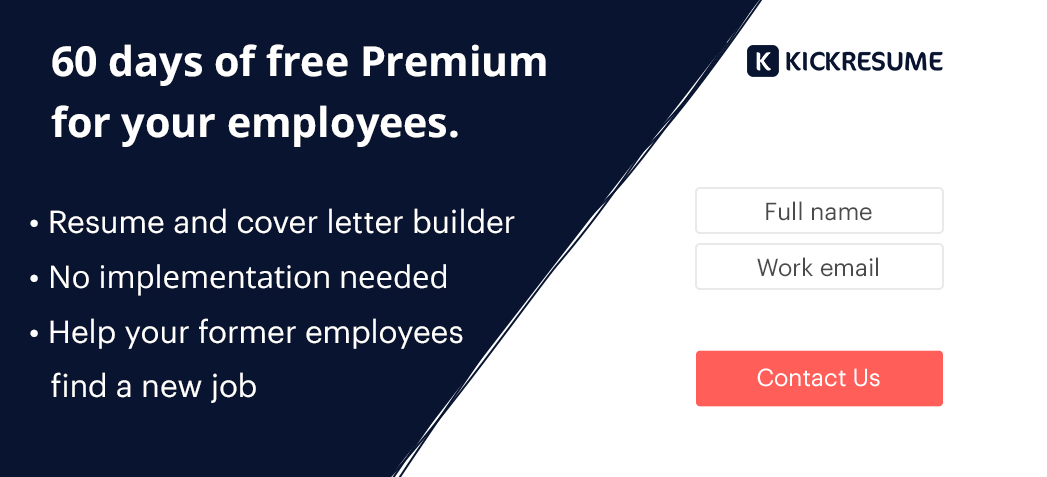American layoffs are at a 20-year low.
That's the title of an article published by Vox on April 9, 2019. One year later, we’re seeing a different number.
According to James Bullard, president and CEO of the Federal Reserve Bank of St. Louis, the potential unemployment rate in the US, stemming from the current corona crisis, could climb up to 30%.
Yes, thirty percent.
That’s more than what Americans experienced during the years following the Great Recession (25% in 1933), which is considered to be the worst economic crisis in modern history.
Hundreds of thousands of Americans are losing jobs every week as businesses are being shattered, productions getting closed and consumer demand is plummeting. Sure, nobody knows what the actual number will be in the end. It may not get to such high figures — and we sure hope it won't.
Yet, everyone knows that dealing with the aftermath will be difficult, unprecedented and challenging.
And for some companies, the challenge of letting employees go has already begun.
The single most difficult thing to do
If you are reading this, there is a good chance you belong to a company that needs to lay off a number of employees just for the business to survive.
Being an HR Manager, CEO or Head of Operations, the whole process rests on your shoulders.
As Dick Grote, a management consultant in Dallas, Texas, and author of How to Be Good at Performance Appraisals, noted: “Firing is the single most difficult thing we ask leaders to do. Even when the business justification is clear, you’re sitting down and telling someone that he’s no longer getting a paycheck and that when he wakes up in the morning, he has no place to go. That’s tough.”
We feel you. It will never get easy or painless. But even in the hardest of times, you can still be empathetic, kind and supportive.
In other words, you can still be human. It will pay off in the long run.

- Do you need to support the employees you are laying off?
- 1. Eliminate all your other options first
- 2. Be transparent and communicate
- 3. Don’t let the layoffs come as a surprise
- 4. Have a plan before you talk to the employees
- 5. Go one step further
- 6. Provide them with letters of recommendation
- 7. Give them time
- 8. Help them find another job
- 9. Create a severance package
- 10. Provide them with a free resume builder
Do you need to support the employees you are laying off?
If you’ve been talking about how valuable your employees are, today is your chance to stay true to your word. Here's why.
Maintain company integrity
This could be a defining moment in your company’s history. Now is the time to back your words about how you value your employees and show integrity as a company both internally and externally.
Your business partners, investors, customers as well as prospects will think much better of you if you treat your employees as valuable assets.
In the end, a good reputation is a fragile thing. But you can leverage even a seemingly terrible situation to strengthen it.
Don't burn bridges
You don't want to burn the bridges you have so painstakingly built over the years. And as much as this applies to employees who are leaving the company, the same should be true for employers.
“People always talk about why employees shouldn’t burn bridges with employers, but not many people talk about the reverse of that. Not many people talk about employers keeping relationships with employees even when they let them go,” Gary Vaynerchuk points out.
For the sake of the future
In the future, once things get better, and you will need to shine to attract the best talent on the market, you want to be perceived as a good employer. Your current and potential employees will look at this moment and scrutinize your actions. What conclusions will they draw?
Evangelists of your business
If you bid farewell to your employees on good terms, they may even become evangelists for your company. Once their new employer will be looking for a service or a product you can deliver, these employees may be willing to make the introduction.
Overall public well-being
Today's business is not purely about profits and costs anymore. As a 21st century company, you should be striving for social responsibility. A big part of that is also the general well-being.
In the words of the International Labor Office, “unemployment has serious social and health consequences”. They also have numbers to back that claim.
“Dr. Harvey Brenner of Johns Hopkins University in the United States found that for every 1% increase in the national unemployment rate there were statistically:
- 37,887 more deaths
- 20,240 more heart failures
- 4,227 more mental hospital admissions
- 3,340 more admissions to state prisons
- 920 more suicides
- 640 more homicides
- 495 more deaths from alcohol-related cirrhosis.”
As you see, even though you cannot let your employees keep their jobs right now, you can always help them get through the whole situation at least a wee bit more easily.
In the end, this “a wee bit more easily” can make a huge difference, both for you and for the employees.
To make it seem a little less abstract, here are 10 practical steps you can apply right away.

1. Eliminate all your other options first
According to a 2010 Harvard Business Review (HBR) study, employee layoffs are not always the best strategy.
The team analyzed 4,700 public companies during three major crises. They came to the conclusion that the best strategy during a crisis is cutting operational costs and making the right investments.
So, on the management level, first ask if you did everything you could to prevent the layoffs. Did you:
- Cut the operational cost wherever possible?
- Cut the benefits and perks?
- Cut management salaries to show you are with your people and understand their situation?
- Try to talk to the employees whether they are willing to take pay cuts?
"Especially as the economy trends downward, employees might be open to taking a pay cut, reduced hours or working in a different capacity such as a contractor. Employers won’t know that unless they talk to their workers directly,” explains Heidi Lynne Kurter, a Leadership Coach & Workplace Culture Consultant.
2. Be transparent and communicate
Open, honest and transparent communication with your employees encourages trust and creativity, leading to mutually beneficial solutions.
Be open, talk to your employees.
Be transparent in your all-hands meetings and try to answer all their questions as honestly as you can. That includes even questions about job security or a potential exit strategy for the company in the worst-case scenario.
This way, you make sure your employees will know that you trust they can handle the situation. It will also give them time to update their resumes and look for a new job or temporary gigs.
3. Don’t let the layoffs come as a surprise
Open and transparent communication is needed even more if the news are bad and times are uncertain.
Hiding information or providing misleading, incomplete information are all likely to break your relationship even with those employees who are allowed to stay with the company.
Everyone in your company, from a desk clerk to Java developer and junior copywriter knows the situation isn't good. After all, they read news and rumors spread fast. Providing a false feeling of comfort isn’t fair.
If your company has been negatively impacted by the ongoing pandemic, itshould be a shared issue of every party involved.

4. Have a plan before you talk to the employees
Telling an employee they are no more needed in your company is mentally and emotionally straining as it is. Can you imagine the challenge during the times of remote work when you cannot have this conversation with an employee in person?
You have to role play what you’re going to say. Be prepared for the conversation. Rehearse it. Be supportive, but straight. Don't prolong the agony.
Emails are not allowed. Even in the time of social distancing, be as personal as you possibly can. Ask them to find a private spot at home for such difficult conversation.
5. Go one step further
We have already mentioned that clear communication is a must.
Yet, as a capable CEO or HR Manager, you should go one step further and take one on ones with those who need to leave the company. Talk through the situation with them. Show them that you care. Ask them how you can help.
After having delivered the news, give them time of a few days to think it through. Then arrange calls with them to see their perspective.
6. Provide them with letters of recommendation
You are letting the employees go just because of the economic crisis.
It has nothing to do with their performance.
Because of that, you are expected to give them proper and well-thought-through letters of recommendation. This means writing them directly for their potential employers or LinkedIn profiles, as well as allowing them to provide your contact information to potential employers for a reference.

7. Give them time
In some countries or industries, employers have an obligation to provide a notice period.
But even if you are not required to do it by law, it is a powerful sign of good will if you commit to it anyway. If you have the resourcec to do that, let the employees stay one or two months longer while they're looking for a job.
Yup, you can get short of some cash flow, but one month of additional pay for the person looking for a job can do miracles both in the options for his new job and in your long term relationship with them.
Firing people from one week to another is not a good long term strategy.
8. Help them find another job
As a CEO or Head of HR, you probably have a big network of other executives, founders or recruiting agencies. You can ask your fellow colleagues whether they know of any openings and forward them to your employees.
Provide them with opportunities that are not listed on job portals and encourage them to apply.
In this way, you will also prove to them they are not being laid off for their performance.
As Jodi Glickman, author and founder of communication consulting firm Great on the Job, said for HBR: “Offer to be helpful. If you genuinely believe someone is a good person who has talents and abilities that could be useful elsewhere, tell her that you’re very happy to provide a reference, or offer to make introductions.”
But don’t overpromise. Don't say you willl find them a job or take them back as soon as the situation gets better. Honesty is the best policy.
9. Create a severance package
A severance package is a good practice many companies employ. Apart from giving your employees time to find a new job, it could also include:
- Additional payment,
- Company stock options,
- Health insurance coverage,
- Sick days or paid leave for job interviews,
- 401k accounts,
- Access to job portals.
Well, there is one additional thing you could include in the package.
10. Provide them with a free resume builder
As a show of good will to your employees and a proof you genuinely care for them, you can give them free access to our services.
Inspired by over 1,500 resume samples and 21,000 pre-written phrases for different job titles, they can build their resumes faster and reduce the time needed to get hired.
Because of COVID-19 and to show our support in the difficult process of employee lay-offs, we have created a special offer:
A free 60-day account with no implementation needed.
Get in touch and we'll share a unique URL with you to share with your employees. This gives your staff all of the Premium Account features, including templates, blogs, guides, videos, etc. to help them on their way to a new job.
Just say the word and we’ll get you started.

To better prepare yourself for opportunities elsewhere, delve into our comprehensive collection of resume samples.



